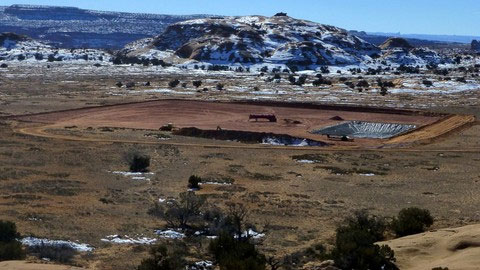
| ABOUT | ARTICLES | FORUM | RESOURCES | GALLERY | CROSS |
 |
|
|||||||||||||
|
||||||||||||||
|
Talk about this article... The Bishop Process: Eastern Utah Public Lands Exchange Proposal for Wilderness and Mineral Extraction January 15, 2014  Drill pad for exploratory potash resources There certainly is plenty of wilderness, potash, and oil shale deposits in eastern Utah. And marginal deposits of tar sands, and conventional oil and gas fields. However, there certainly isn't plenty of water. In fact, the Colorado River has nothing left to give. The water you see in this landscape, is already spoken for, because the Colorado River is shared with 35 million people. Despite the upper basin state's desire to develop another one million acre-feet per year, the total supply has been declining by one million acre-feet every 50-years since the beginning of the 20th century. This trend will continue to the end of the present century, according to the agency that regulates the basin's surface water, the Bureau of Reclamation (Final Report) Why then, is the Utah congressional delegation so eager to make a deal with the public they serve? Knowing that sizeable depletions from the Colorado River system for water intensive extractive industries will send the entire basin into huge legal battles over water rights? Not only will this deal be bad for Utah's water security, it will be bad for all the people who depend on the gift of the Colorado River. Summary of what the extractive industries want:
GRAND COUNTY ALTERNATIVES NEWS COVERAGE
LETTERS to the Grand County Council due May 7th, 2014 Letter from Canyonlands Watershed Council & Addendum.
LETTERS to the Grand County Council due January 30, 2014
CONGRESSIONAL TESTIMONY
DOCUMENT ARCHIVE
BLM'S 1992 BOOK CLIFFS HIGHWAY DRAFT EIS
MAPS Talk about this article... |
| ||||